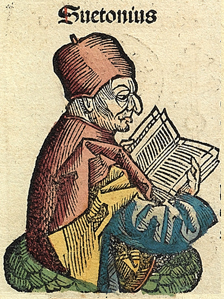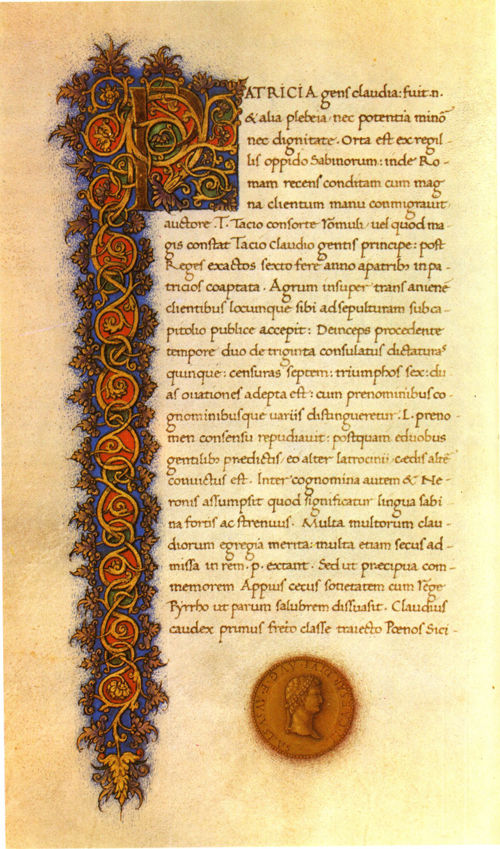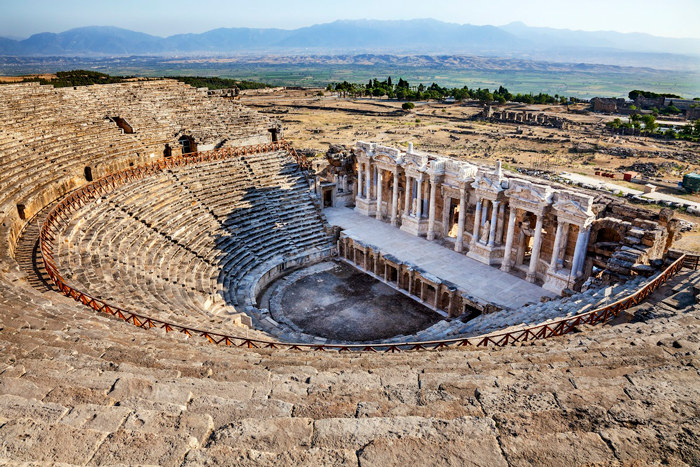
|
This is a non-WLC article. When using resources from outside authors, we only publish the content that is 100% in harmony with the Bible and WLC current biblical beliefs. So such articles can be treated as if coming directly from WLC. We have been greatly blessed by the ministry of many servants of Yahuwah. But we do not advise our members to explore other works by these authors. Such works, we have excluded from publications because they contain errors. Sadly, we have yet to find a ministry that is error-free. If you are shocked by some non-WLC published content [articles/episodes], keep in mind Proverbs 4:18. Our understanding of His truth is evolving, as more light is shed on our pathway. We cherish truth more than life, and seek it wherever it may be found. |

Humphreys, the “historian” at http://www.jesusneverexisted.com tries to make the case that Yahushua never existed and that the Christian message was nothing unique or new. He claims that:
…nothing in the “Christian message” was original. Brotherly love and compassion had been taught by the Stoics for centuries. The Christian faith was a vulgarized paganism, set to the theme of the Jewish prophets and debased by religious intolerance… a “life” conjured up from mystical fantasy, a mass of borrowed quotations, copied story elements and a corpus of self-serving speculation, does not constitute an historical reality.1

He makes this assertion, based on no evidence, mind you, only on a declaration of his own interpretation of history, which ignores the accounts found in Matthew, Mark, Luke, and John, and even denies the testimony of those who weren’t Yahushua’s followers, such as the first-century Jewish historian Josephus Flavius who wrote in his Antiquities:
Now, there was about this time Jesus [Yahushua], a wise man, if it be lawful to call him a man, for he was a doer of wonderful works—a teacher of such men as receive the truth with pleasure. He drew over to him both many of the Jews, and many of the Gentiles. He was [the] Christ; and when Pilate, at the suggestion of the principal men amongst us, had condemned him to the cross, those that loved him at the first did not forsake him, for he appeared to them alive again the third day, as the divine prophets had foretold these and ten thousand other wonderful things concerning him; and the tribe of Christians, so named from him are not extinct at this day.2
I realize that many scholars would say this is an interpolation added later by those who copied the text, but this cannot be known for sure! Even if some of it was embellished, was ALL of it embellished? How can anybody be sure Josephus didn’t add the changes? Josephus also mentioned James, the brother of Yahushua, in his Antiquities, saying:
Festus was now dead, and Albinus was but upon the road; so he assembled the Sanhedrim of judges, and brought before them the brother of Jesus [Yahushua], who was called Christ, whose name was James, and some others, [or, some of his companions]; and when he had formed an accusation against them as breakers of the law, he delivered them to be stoned: but as for those who seemed the most equitable of the citizens, and such as were the most uneasy at the breach of the laws, they disliked what was done; they also sent to the king [Agrippa], desiring him to send to Ananus that he should act so no more, for that what he had already done was not to be justified; nay, some of them went also to meet Albinus, as he was upon his journey from Alexandria, and informed him that it was not lawful for Ananus to assemble a Sanhedrim without his consent. Whereupon Albinus complied with what they said, and wrote in anger to Ananus, and threatened that he would bring him to punishment for what he had done; on which king Agrippa took the high priesthood from him, when he had ruled but three months, and made Jesus, the son of Damneus, high priest.
Notice that Josephus mentioned two Yahushuas. One that was the “Christ,” the other that was the “son of Damneus.
Pliny the Younger, governor of Bythinia, writing about AD110 to Trajan, the Roman emperor, says that he didn’t know how others dealt with the Christians, but describes how he decided to handle them:
I have never been present at the examination of the Christians [by others], on which account I am unacquainted with what [used] to be inquired into, and what, and how far they used to be punished; nor are my doubts small, whether there be not a distinction to be made between the ages [of the accused]? and whether tender youth ought to have the same punishment with strong men? Whether there be not room for pardon upon repentance?” or whether it may not be an advantage to one that had been a Christian, that he has forsaken Christianity? Whether the bare name, without any crimes besides, or the crimes adhering to that name… be… punished? In the meantime, I have taken this course about those who have been brought before me as Christians. I asked them whether they were Christians or not? If they confessed that they were Christians, I asked them again, and a third time, intermixing threatenings with the questions. If they persevered in their confession, I ordered them to be executed; for I did not doubt but, let their confession be of any sort whatsoever, this positiveness and inflexible obstinacy deserved to be punished.3
The Roman historian Tacitus writes in his Annals that the Christians were persecuted in AD 64 by the emperor Nero. After the fire that destroyed much of the city of Rome, he attempted to squelch rumors that he had started the fire by shifting the guilt away from himself and onto the Christians.
To get rid of the report, Nero fastened the guilt and inflicted the most exquisite tortures on a class hated for their abominations, called Christians by the populace. Christus, from whom the name had its origin, suffered the extreme penalty during the reign of Tiberius at the hands of one of our procurators, Pontius Pilatus, and a most mischievous superstition, thus checked for the moment, again broke out not only in Judea, the first source of the evil, but even in Rome, where all things hideous and shameful from every part of the world find their centre and become popular. Accordingly, an arrest was first made of all who pleaded guilty; then, upon their information, an immense multitude was convicted, not so much of the crime of firing the city, as of hatred against mankind. Mockery of every sort was added to their deaths. Covered with the skins of beasts, they were torn by dogs and perished, or were nailed to crosses, or were doomed to the flames and burnt, to serve as a nightly illumination, when daylight had expired.4

 Seutonius, another Roman historian, writing in The Twelve Caesars, affirms the words of Pliny, saying about Nero that after the fire of Rome, “punishments were also inflicted on the Christians, a sect professing a new and mischievous religious belief.”5 There are also references to Yahushua by the second-century playwright, Lucian. In the play, The Passing of Peregrinus, he mocks the simplistic and gullible church, whose leader was crucified in Palestine, [vi] for embracing a scoundrel who takes advantage of their generosity.
Seutonius, another Roman historian, writing in The Twelve Caesars, affirms the words of Pliny, saying about Nero that after the fire of Rome, “punishments were also inflicted on the Christians, a sect professing a new and mischievous religious belief.”5 There are also references to Yahushua by the second-century playwright, Lucian. In the play, The Passing of Peregrinus, he mocks the simplistic and gullible church, whose leader was crucified in Palestine, [vi] for embracing a scoundrel who takes advantage of their generosity.
To say that the Christians “created” a religion by pasting together myths, fictional narratives, and borrowed phrases is a ridiculous claim, because the sayings of Christ were so sublime and so revolutionary that the creator of this narrative would have had to be one of the most brilliant persons that ever existed. As Joseph Parker wrote in Ecce Deus, “only a Christ could have conceived of a Christ.”7
Is it possible that the polytheistic ancient world, which heretofore had created no real morality, could have possibly given birth to the Christ myth and now produced the ideal man? One of the problems with Stoicism, for example, was its inability to produce their “wise man” in human shape. They looked in vain for this “man,” and in a parody to Zeno, the founder of Stoicism, who had said, “It is reasonable to honour the gods: it is not reasonable to honour the non-existent: therefore the gods exist,” they found it necessary to resort to the same circular reasoning when it came to finding the perfect role model, “It is reasonable to honour wise men: it is not reasonable to honour the non-existent: therefore wise men exist.”8 But they couldn’t find the wise man. They couldn’t even imagine him. Their gods fell far short of the ideal.
But now, are we to suppose that an obscure writer of unknown origins was somehow able to create the Stoics’ “wise man,” and yet no mention is ever made of this mastermind? If this person, who created the perfect God narrative, exists, why doesn’t some person somewhere mention this writer? Instead, posterity has been given four different accounts of the actual life of this man, Yahushua Christ. Should we toss these testimonies aside so easily, especially when they agree so precisely with the secular historical record, and believe instead in the existence of a hidden author, when there’s no evidence whatsoever that this writer ever existed? In other words, in order to not believe in the historical Yahushua, we’d rather believe in a brilliant unknown author when there’s no record this person ever existed. Which takes more faith?
It’s also worth asking how, since the gospels weren’t written down until thirty years or so after the death of Yahushua, the concept of the mythical Christ got communicated to all the Christians who were already dying in the arena, stoned by the Sanhedrin, and burning on Nero’s stakes. Was it merely through the hearing of a mythical story, or was it because they saw and knew Yahushua? If it was a myth, wouldn’t this be common knowledge? Who would die for that?
Regardless of whether or not there was a secret writer, or whether or not the testimonies of the secular historians were embellished, as some skeptics claim, those who deny the existence of Yahushua can’t deny that a group of people known as “the Christians” exists.
A small group of “believers” would burst onto the world scene with a passion and moral fervor that would shake an empire and finally conquer it without lifting a weapon. These followers of “The Way” claimed that their zeal came as a result of a man named Yahushua. Those who deny the historical existence of Christ would have us believe that the church’s fervor was the result of a type of fairytale or myth that was merely a mishmash of paganism and philosophy. But the content of the Christian message was contradictory to these “sources” that the gospels were supposedly formed from.
So the question is: Where did these Christians come from? Are we to believe that they were “spontaneously generated” like flies from rotten meat or that they sprung forth from the primordial soup?
The Greek myths had their source in Homer, and the Mormon scriptures had their source in Joseph Smith. Buddhism had a Buddha and communism had its Karl Marx. Again, I ask, was the source of Christianity found in Yahushua, as so many testify, or in an unknown ghostwriter who made up the whole story? Who is “conjuring up a ‘life’?”

And is it not worth mentioning that nearly all of the disciples referred to in these fictional narratives were put to death for their beliefs? Would they all have died for a fairytale or a lie? John Foxe, in his Book of Martyrs, describes the works and deaths of Yahushua’ disciples. In their allegiance to the “fairytale” character, Yahushua:
Thomas preached to the Parthians, Medes and Persians, also to the Carmanians, Hyrcanians, Bactrians and Magians. He suffered in Calamina, a city of India, being slain with a dart. Simon, who was brother to Jude, and to James the younger, who all were the sons of Mary Cleophas and of Alpheus, was Bishop of Jerusalem after James, and was crucified in a city of Egypt in the time of Trajan the emperor. Simon the apostle, called Cananeus and Zelotes, preached in Mauritania, and in the country of Africa, and in Britain: he was likewise crucified.9
According to Clement, James, the brother of John, was beheaded. And Foxe goes on to say that tradition has it that Mark was burnt alive in Egypt. Bartholomew was “beaten down with staves, then crucified; and after… he was beheaded.”10 Andrew was crucified by Aegeas in the city of Patrae. Matthew preached Yahushua “the fairytale” in Egypt and Ethiopia, after which King Hircanus “sent one to run him through with a spear.”11
Philip was crucified and stoned in the city of Hieropolis. And James, the brother of Yahushua, was thrown off the pinnacle of the Temple during Passover, but didn’t die and started to pray for his persecutors when he was struck on the head by somebody in the mob with a blunt instrument and killed.

These were real people in real places, not gods on Mt. Olympus! And unlike Muslim terrorists, who die to gain heaven, while not seeing Allah or knowing Muhammed, who lived centuries ago, the disciples lived contemporaneously with Christ. If he wasn’t real if he was instead a character created by a ghostwriter, would they still have given of themselves so passionately? Yahushua was a man, friend, and brother to them. If he wasn’t real, wouldn’t someone have squealed? Yet there’s no record anywhere of anyone—Roman, Jew, Greek, or otherwise—declaring that he didn’t exist. Wouldn’t there be an outcry or a response from the Roman world somewhere that all these men were delusional? Wouldn’t somebody mock them? Wouldn’t somebody mention that their story was contrived? After all, the Christians were being killed and crucified by kings, priests, and mobs all over the ancient world—they didn’t remain obscure—and yet there’s no attempt anywhere to discredit them by saying that Yahushua was just a myth!
The story of Yahushua is an actual account in real time with real people who had names and lived in actual cities and towns. It wasn’t a fairytale with imaginary names and imaginary figures. There was no fantasy house in an unknown woods where Snow White would encounter seven dwarves and be protected from a witch. Instead, the gospel accounts mention Augustus, Herod, the Sea of Galilee, the Temple, real people who go on to be recorded in history, such as Pontius Pilate, and events such as the census taken during the time Quirinius was the governor of Syria. Anyone in the ancient world could have disputed these facts and declared them to be lies. They could have interviewed anyone mentioned in the gospels and asked them if what was recorded was true, but nobody did. Instead, there are references to Yahushua in secular sources, which treat his existence as a matter of fact.
Those who claim that Yahushua didn’t exist arrogantly suggest that those who “ignorantly” believe in Christ need to be enlightened. Listen to the attitude and tone of those who claim that Yahushua never existed:
“Do you really think it all began with a sanctimonious Jewish wonder-worker, strolling about 1st century Palestine? Prepare to be enlightened.”12
But it seems to me that those who need to be enlightened are those who proudly insist that Yahushua is made up—with no evidence to stand on except their own “conjured up ‘life’”—the mystery writer. Who truly are the “self-serving” speculators who can’t face historical reality?
1 Ken Humphreys, “Godman—Gestation of a Superhero,” www.jesusneverexisted.com (accessed 2/14/2009).
2 Flavius Josephus, The Works of Flavius Josephus, Volume II, trans. William Whiston (New York: A.L. Burt, n.d.), 443.
3 Pliny the Younger, “Pliny’s Epistle to Trajan About 112 CE,” PBS Online, Frontline: From Yahushua to Christ: The First Christians, http://www.pbs.org/wgbh/pages/frontline/shows/religion/ (accessed 2/14/2009).
4 P. Cornelius Tacitus, The Annals and Histories. trans. Alfred John Church, William Jackson Brodribb (Chicago: William Benton, 1952), 168.
5 Seutonius, The Twelve Caesars, trans. Robert Graves (Baltimore, MD: Penguin Books, 1960), 217.
6 Lucian, “Lucian of Samasota: The Passing of Peregrinus,” The Tertullian Project, http://www.tertullian.org/rpearse/lucian/peregrinus.htm (accessed 2/9/2008).
7 McDowell, Evidence, 127.
8 Edward Vernon Arnold, Roman Stoicism: Being Lectures on the History of the Stoic Philosophy with Special Reference to its Development Within the Roman Empire (Cambridge, MA: Cambridge University Press, 1911), 286.
9 John Foxe, Foxes’ Book of Martyrs (Pittsburgh, PA: Whitaker House, 1981), 7.
10 Ibid.
11 Ibid., 9.
12 Kenneth Humphreys, “Yahushua—The Imaginary Friend,” www.Yahushuaneverexisted.com (accessed 2/14/2009).
13 Plato recognized the inadequacy of the Greek gods as a source of education for young people because they weren’t heroic but selfish, and, therefore, couldn’t be used as role models for his “Republic.” He said that the myths, which were filled with stories of greed and lust, were “likely to have a bad effect on those who hear them; for everybody will begin to excuse his vices when he is convinced that similar wickednesses are always being perpetrated by” the gods. Therefore he thought it necessary to “put an end to such tales, lest they engender laxity of morals among the young.” (The Works of Plato, Four Volumes in One. trans. B. Jowett [New York: J.J. Little and Ives Co., n.d.], 93.) Many in the early church, such as Justin Martyr, thought that Plato would have been a Christian if he had lived long enough to see Christ. It is particularly tempting to view The Allegory of the Cave as a search for Christ.
This is a non-WLC article by Dina Lesperance.
We have taken out from the original article all pagan names and titles of the Father and Son, and have replaced them with the original given names. Furthermore, we have restored in the Scriptures quoted the names of the Father and Son, as they were originally written by the inspired authors of the Bible. -WLC Team